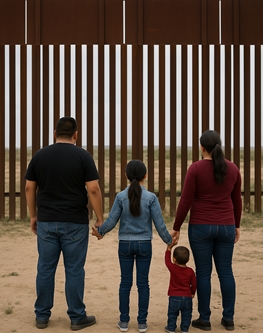What I Don’t Know and Why That Matters
I don’t claim to have the answers – not about immigration, not about how we responsibly manage resources, and certainly not about how we reconcile compassion with infrastructure. But I do feel the weight of the questions. They press in from every angle: ethical, logistical, human. And the longer I sit with them, the more urgent I feel they become.
Migration Isn’t a Mystery – It’s a Response to Crisis
We’ve witnessed a staggering influx of migrants, many from Central and South America, driven by collapsed economies, organized crime, political instability and climate disasters. These aren’t people chasing comfort; they’re escaping crisis and trying to rebuild. It’s hard not to sympathize. But it’s also hard not to feel the tension. Where do people go? How do we provide food, shelter, education and healthcare? Where does the funding come from? The strain is real. Ignoring it doesn’t help anyone.
Immigration Under Trump Prioritizes Punishment Over Solutions
And yet, instead of asking how we can address these challenges honestly and strategically, Trump’s immigration policy has turned toward cruelty and spectacle. Billions are spent on detention centers, deportation flights, surveillance infrastructure, private contractors, legal battles and even offshore prisons. For what? To traumatize families, destabilize communities and sidestep the actual causes of migration: poverty, climate collapse, violence and political corruption.
Why are we funneling endless resources into enforcement while legal pathways shrink? Why are we investing in trauma instead of stability?
Trump’s Immigration Strategy: Cruel, Sweeping and Remorseless
My gut tells me this: the policies we’re seeing aren’t just flawed. They’re reflections of Trump himself. They’re carried out without remorse, driven by a mindset that values control over compassion. Trump ran on a promise to remove the “criminal element,” but his administration has targeted legal immigrants, asylum seekers, naturalized citizens and student activists. Due process has been discarded. Red Scare-era laws resurrected. ICE raids carried out in schools, hospitals and courthouses.
This isn’t strategic enforcement. It’s calculated punishment.
Racial Bias Is Baked Into Immigration Under Trump
It’s hard to ignore the racial undercurrent. These policies disproportionately target Black and Brown immigrants. We’ve heard rhetoric about “poisoning the blood,” as if heritage is a threat. Even American citizens who speak out have faced threats of deportation. Immigration has become less about law and more about identity, about who gets to belong and who doesn’t.
These tactics echo white nationalist language and reinforce divisions that have nothing to do with legality or safety. This is a policy failure and a moral failure.
Better Questions, Not Many Answers
I don’t have the answers to how we uphold humanitarian values while ensuring our shelters, schools, courts, and services don’t buckle. But I have plenty of questions.
- Why are families fleeing violence being corralled like criminals?
- Why are naturalized citizens living in fear of losing their status?
- Why are asylum claims denied en masse before they’re truly heard?
- Why does seeking refuge lead to incarceration in a country that claims to value freedom?
- Why are people deported to places where death is likely, with no accountability?
- Why are migrant children still separated from their families?
- Why are humanitarian parolees treated as threats instead of survivors?
- Why does the law bend so easily toward punishment and so rarely toward protection?
Between Open Borders and Zero Tolerance – There’s Room for Humanity
Somewhere between the extremes, between open borders and zero tolerance, there’s a conversation waiting. One rooted in facts. One grounded in compassion. Let’s talk about what it means to be a nation of immigrants. Let’s ask what kind of country we want to be.
